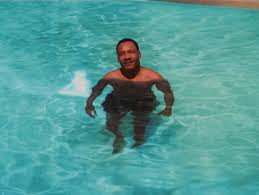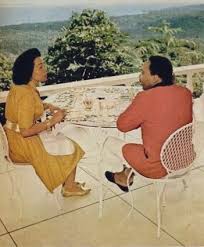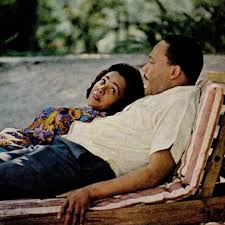Martin Luther King's Love for Jamaica: A Journey of Inspiration and Solidarity
- Main Street Rose Hall

- Jan 16
- 5 min read
Updated: Jan 20
Celebrating Martin Luther King Jr., the revered leader of the American Civil Rights Movement, is celebrated globally for his unwavering commitment to justice, equality, and nonviolent resistance. While his work primarily focused on the United States, King's influence and admiration extended far beyond its borders. One such place that held a special place in his heart was Jamaica. This Caribbean island, with its rich cultural heritage and historical struggles against oppression, resonated deeply with King. In this article, we explore Martin Luther King's love for Jamaica, his visits to the island, the impact of Jamaican culture on his life and work, and the lasting legacy of his connection to the country.
Below is a famous quote he had said about Jamaica and Jamaicans:
“Here you have people from many national backgrounds: Chinese, Indians, so-called Negroes, and you can just go down the line, Europeans, European and people from many, many nations. Do you know they all live there and they have a motto in Jamaica, “Out of many people, one people.” And they say, “Here in Jamaica we are not Chinese, (Make it plain) we are not Japanese, we are not Indians, we are not Negroes, we are not Englishmen, we are not Canadians. But we are all one big family of Jamaicans.”

The Roots of King's Connection to Jamaica
Shared Struggles and Aspirations
Martin Luther King Jr.'s connection to Jamaica can be traced back to the shared struggles and aspirations of African Americans and Jamaicans. Both communities faced centuries of colonialism, slavery, and racial discrimination. These parallel histories created a sense of solidarity and mutual understanding between King and the people of Jamaica. The island's history of resistance against colonial rule and its fight for independence resonated with King's own struggle for civil rights in the United States.
Influence of Jamaican Leaders
Jamaican leaders such as Marcus Garvey, a prominent black nationalist and Pan-Africanist, had a significant impact on King's thinking. Garvey's philosophy of black pride, self-reliance, and global African unity inspired many leaders of the Civil Rights Movement, including King. Garvey's teachings underscored the importance of cultural identity and economic empowerment, themes that King often echoed in his speeches and writings.

Martin Luther King's Visits to Jamaica
First Visit in 1965
Martin Luther King's first visit to Jamaica was in 1965, a pivotal year in the Civil Rights Movement. Invited by the University of the West Indies, King was scheduled to deliver a series of lectures and meet with Jamaican leaders. During this visit, he was warmly received by the Jamaican people, who saw him as a symbol of hope and resistance against racial oppression.
Address at the University of the West Indies
On June 20, 1965, King delivered a powerful address at the University of the West Indies in Mona. In his speech, titled "The Future of Integration," King emphasized the interconnectedness of the global struggle for human rights. He spoke about the importance of solidarity between oppressed peoples worldwide and the need for continued vigilance in the fight against injustice. King's message resonated deeply with his Jamaican audience, reinforcing the bond between the Civil Rights Movement in the United States and the anti-colonial struggle in Jamaica.

Meetings with Jamaican Leaders
During his visit, King also met with prominent Jamaican leaders, including Prime Minister Sir Alexander Bustamante and Opposition Leader Norman Manley. These meetings were significant as they allowed King to engage in meaningful dialogue with leaders who were instrumental in shaping Jamaica's path to independence. The exchange of ideas and experiences further strengthened the connection between the Civil Rights Movement and Jamaica's fight for freedom.
Exploring Jamaican Culture
King's visit to Jamaica was not only about speeches and meetings; he also took the time to immerse himself in the island's vibrant culture. He visited historical sites, explored the beautiful landscapes, and interacted with the local people. King was deeply moved by the warmth and hospitality he experienced in Jamaica, and he often spoke fondly of the island and its people in subsequent speeches and writings.

The Impact of Jamaican Culture on King
Music and Spirituality
Jamaican music, particularly reggae, had a profound impact on Martin Luther King Jr. The powerful messages of resistance, hope, and unity conveyed through reggae resonated with King's own philosophy of nonviolent resistance and social justice. Artists like Bob Marley, whose music spoke to the struggles and aspirations of the oppressed, inspired King and reinforced his commitment to the cause.
Jamaican spirituality also influenced King. The island's rich religious traditions, including Rastafarianism, emphasized the importance of spiritual resilience and liberation. King's Christian faith and his belief in the power of spiritual strength to overcome adversity found common ground with Jamaican spiritual practices. This connection deepened his respect for the island's cultural and religious heritage.

Literature and Intellectual Exchange
Jamaican literature, with its focus on themes of identity, resistance, and liberation, also had an impact on King. Works by Jamaican authors such as Claude McKay and Louise Bennett-Coverley explored the complexities of colonialism and the quest for freedom, themes that resonated with King's own experiences and struggles. The intellectual exchange between King and Jamaican scholars enriched his understanding of global struggles for justice and equality.
Legacy of King's Connection to Jamaica
Inspiration for Jamaican Activists
Martin Luther King Jr.'s connection to Jamaica inspired many Jamaican activists and leaders. His philosophy of nonviolent resistance and his commitment to social justice became guiding principles for those fighting against oppression in Jamaica. King's visits and speeches in Jamaica reinforced the island's own struggle for equality and provided a source of inspiration for future generations.
Commemorations and Memorials
King's legacy in Jamaica is commemorated through various memorials and events. Streets, schools, and public spaces named in his honor serve as reminders of his impact on the island. Annual events such as Martin Luther King Jr. Day are observed in Jamaica, reflecting the enduring respect and admiration for his contributions to the global fight for justice.
Continued Cultural Exchange
The connection between Martin Luther King Jr. and Jamaica continues to foster cultural exchange between the United States and Jamaica. Artistic collaborations, educational programs, and social initiatives that draw on King's legacy strengthen the bond between the two countries. These exchanges promote mutual understanding and solidarity, reflecting the shared values of justice and equality.

Influence on Modern Movements
King's love for Jamaica and his commitment to global justice have influenced modern movements for social change. Activists and leaders around the world draw inspiration from King's philosophy and his connection to Jamaica. The principles of nonviolent resistance, solidarity, and cultural pride continue to shape contemporary struggles for justice and equality.
Martin Luther King Jr.'s love for Jamaica is a testament to the power of solidarity and shared struggles in the quest for justice and equality. From his early influences to his impactful visits, King's connection to Jamaica enriched his understanding of global oppression and inspired his work in the Civil Rights Movement. The island's culture, music, and spirituality resonated deeply with King, reinforcing his commitment to nonviolent resistance and social justice.
King's legacy in Jamaica continues to inspire activists, leaders, and communities, fostering a lasting bond between the United States and Jamaica. His visits, speeches, and interactions with Jamaican leaders and people have left an indelible mark on the island's history and its ongoing fight for freedom. As we remember Martin Luther King Jr., we celebrate not only his contributions to the Civil Rights Movement but also his enduring love for Jamaica and his unwavering commitment to justice for all.
Visit Main Street Rose Hall, Montego Bay when next in Jamaica and buy Jamaican made products at several of their stores and Artisan Craft Market. Come and celebrate MLK Day with us! We are open on Monday, January 20. Enjoy our murals, installations, tax-free & souvenir stores, rums & spirits, Jamaican Blue Mountain Coffee, art gallery, resort wear, Jamaican F&B options and much more while relaxing and listening to authentic Jamaican music.
Follow us on Instagram @MainStreetRoseHall and on Tik Tok @main.street.rose.hall
Take pictures, post & tag us! #MainStreetRoseHall #ExperienceTheBestOfJamaica Main Street Rose Hall support Jamaican Made products. #BuyJamaicanEmployJamaicans



.png)








